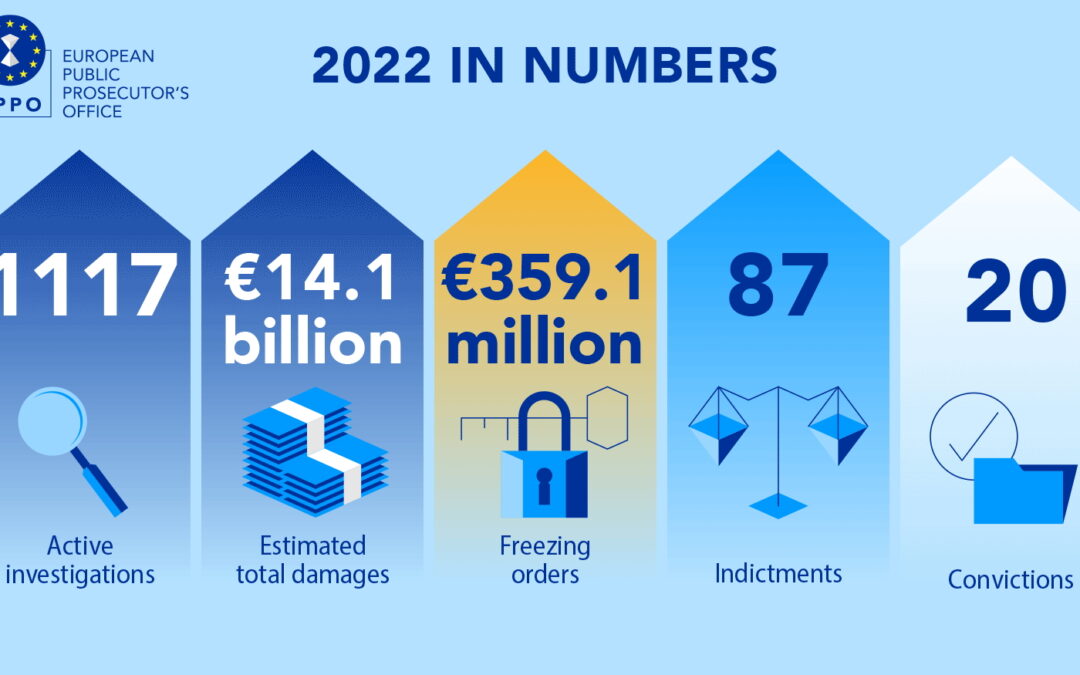The Annual Report for the activities of the European Public Prosecutor’s Office (EPPO) in 2022 shows a clear focus on EU fraud affecting public revenue, in particular cross-border VAT fraud. By the end of 2022, the EPPO had 1117 active investigations with overall estimated damages of €14.1 billion, nearly half of which (47%) resulted from VAT fraud.
The full Annual Report 2022 can be consulted here.
In 2022, the EPPO received and processed 3318 crime reports and opened 865 investigations. Moreover, judges granted the freezing of €359.1 million in EPPO investigations (compared to €147.3 million in 2021), which represents more than seven times the organisation’s 2022 budget.
2022 in numbers
Some of the key figures featured in the Annual Report, valid on 31 December 2022:
- 3318 crime reports were processed;
- 865 investigations were opened;
- 1117 active investigations with estimated damages of €14.1 billion;
- 16.5% of active investigations (185) were linked to VAT fraud, but account for 47% of the estimated damages (€6.7 billion);
- €359.1 million in freezing orders granted;
- 114 European Delegated Prosecutors in active employment;
- 217 staff members at the central office in Luxembourg.
Fraud detection on the rise
The European Delegated Prosecutors form the front line of the EPPO, working on the decentralised level in the 22 participating EU Member States. In all the different Member States, they have the same priorities and implement the same prosecutorial policy, as defined by the College of the EPPO. Their focus is on complex, cross-border investigations into sophisticated economic and financial criminality, in particular where serious organised criminality is involved.
In 2022, most of the backlog of cases opened by national authorities that were passed on to the EPPO was processed, and all the new reports about suspicions of fraud coming from all possible sources were dealt with. In total, 3318 crime reports were received. The proportion of reports from private parties (58%) is very high, which is an expression of great expectations from EU citizens towards the EPPO as a European Union judicial body.
A first positive evolution with regard to the level of detection of fraud affecting the financial interests of the EU in some Member States could be perceived. There are now more investigations into EU fraud initiated in the 22 participating Member States than the historical average before the EPPO’s establishment. This is particularly visible on the revenue side of the EU budget, with an increased focus by some national authorities starting to bear fruit, as well as the EPPO using its ‘helicopter view’ and capacity to identify links that had remained hidden, so far.
However, significant discrepancies remain, and these need to be addressed for the EPPO to be able to make a lasting change, particularly in the fight against cross-border VAT fraud.
The numbers in the EPPO’s 2022 Annual Report are very encouraging, but they do not yet mirror the expected gradual improvement of the overall level of detection of EU fraud. With the first projects funded under the Recovery and Resilience Facility only starting to be implemented, neither do they mirror the growth of the volume of financial interests of the EU to protect.
Review of the EPPO Regulation
In order to reach its full potential, the EPPO Regulation must be reviewed as soon as possible on several critical aspects. Beyond the need to simplify the administrative complexity of the EPPO, as well as to correct, for example, the rule on the partial replacement of its College, the EPPO must be able to exercise its competence for offences such as smuggling under the same conditions in all the participating Member States. Otherwise, criminal organisations are given the possibility to escape the most powerful prosecution available by simply moving their activities to another country. In addition, the rules concerning cross-border cooperation between European Delegated Prosecutors, and in particular the regime of judicial authorisation of investigative measures, are already the object of clarification in front of the European Court of Justice, with the risk of backsliding on the EU judicial cooperation acquis.

